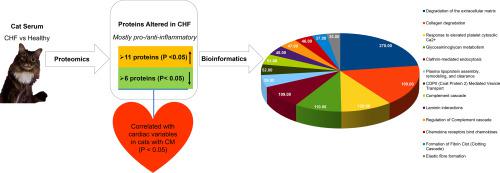Journal of Proteomics ( IF 2.8 ) Pub Date : 2020-07-09 , DOI: 10.1016/j.jprot.2020.103896 Mengmeng Liu 1 , P David Eckersall 2 , Vladimir Mrljak 3 , Anita Horvatić 3 , Nicolas Guillemin 3 , Asier Galan 3 , Liza Köster 4 , Anne French 5

|
The pathogenesis of feline cardiomyopathy and congestive heart failure (CHF) requires further understanding. In this study, we assessed serum proteome change in feline CHF, aiming to identify novel biomarker for both research and clinical use. The study comprised 15 cats in CHF, 5 cats in preclinical cardiomyopathy and 15 cats as healthy controls. Serum proteome profiles were obtained by tandem mass tag labelling followed by mass spectrometry. Protein concentrations in CHF cats were compared with healthy controls. Western blot was performed for proteomic validation. Correlations were assessed between the altered proteins in CHF and clinical variables in cats with cardiomyopathy to evaluate protein-cardiac association. Bioinformatic analysis was employed to identify pathophysiological pathways involved in feline CHF. Sixteen serum proteins were significantly different between CHF and healthy control cats (P < .05). These included serine protease inhibitors, apolipoproteins and other proteins associated with inflammation and coagulation. Clinical parameters from cats with cardiomyopathy significantly correlated with the altered proteins (P < .05). Bioinformatic analysis identified 13 most relevant functional profiles in feline CHF, which mostly associated with extracellular matrix organization and metabolism.
Data are available via ProteomeXchange with identifier PXD017761.
Significance
Cardiomyopathies affect both cats and humans, and they can cause serious consequence such as congestive heart failure (CHF). To date, the pathophysiological mechanism of CHF is not fully understood. In this study, for the first time, we used a proteomic approach combined with bioinformatic analysis to evaluate serum protein change in cats with CHF. Results indicate systemic inflammation, coagulation protein changes, innate immunity and extracellular matrix remodeling are involved in feline CHF, which are largely comparable with findings in previous human studies. Our study provides new insights into CHF and cardiomyopathy in cats, and the identified novel biomarkers and pathophysiological pathways provide valuable information for future studies.
中文翻译:

患有原发性心肌病的充血性心力衰竭猫的新型生物标志物。
猫心肌病和充血性心力衰竭(CHF)的发病机理需要进一步了解。在这项研究中,我们评估了猫CHF的血清蛋白质组变化,旨在鉴定用于研究和临床用途的新型生物标志物。这项研究包括15例CHF猫,5例临床前心肌病猫和15例健康对照猫。血清蛋白质组图谱通过串联质谱标签标记,随后进行质谱分析获得。将CHF猫中的蛋白质浓度与健康对照组进行比较。进行蛋白质印迹以进行蛋白质组学验证。在患有心肌病的猫中,评估了CHF中改变的蛋白质与临床变量之间的相关性,以评估蛋白质与心脏的关联。利用生物信息学分析来确定猫CHF涉及的病理生理途径。P <.05)。这些包括丝氨酸蛋白酶抑制剂,载脂蛋白和其他与炎症和凝血相关的蛋白。患有心肌病的猫的临床参数与蛋白质改变显着相关(P <.05)。生物信息学分析确定了猫CHF中13个最相关的功能谱,这主要与细胞外基质的组织和代谢有关。
数据可通过ProteomeXchange获得,其标识符为PXD017761。
意义
心肌病会影响猫和人类,并且会引起严重后果,例如充血性心力衰竭(CHF)。迄今为止,CHF的病理生理机制尚未完全了解。在这项研究中,我们首次使用蛋白质组学方法结合生物信息学分析来评估CHF猫的血清蛋白变化。结果表明,猫CHF涉及全身性炎症,凝血蛋白变化,先天免疫力和细胞外基质重塑,这在很大程度上与以前的人类研究相当。我们的研究为猫的CHF和心肌病提供了新的见识,并且已发现的新颖生物标志物和病理生理途径为将来的研究提供了有价值的信息。










































 京公网安备 11010802027423号
京公网安备 11010802027423号